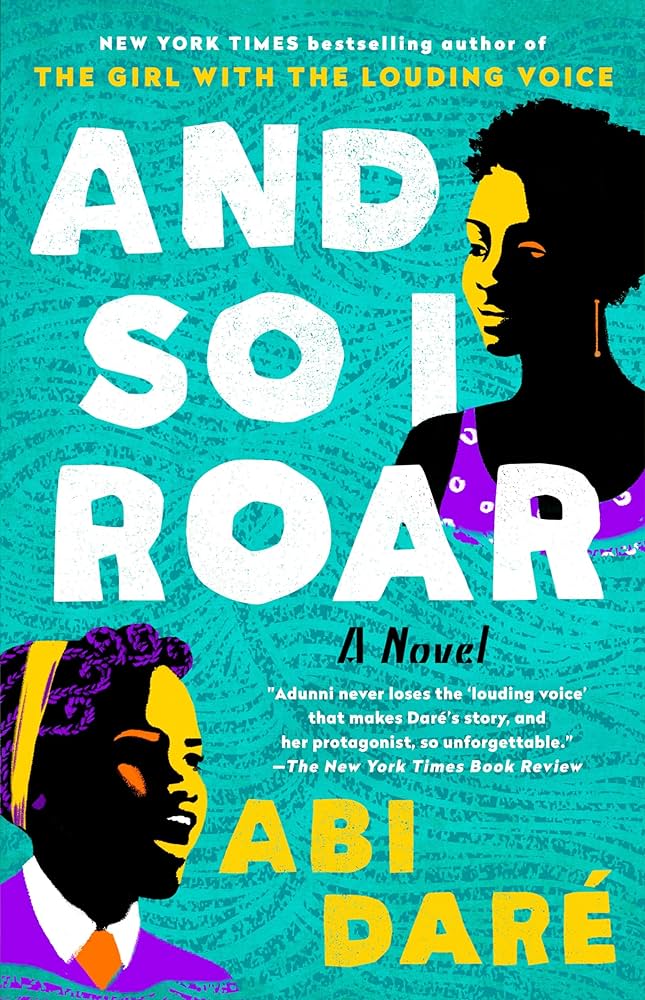Nigerian literature possesses a remarkable ability to create female characters who defy the ordinary. These women don’t just exist within their stories; they embody a resilience that transcends the page. They redefine what it means to navigate the complexities of motherhood, societal pressures, and personal battles in a world that often seems intent on testing its limits.
What makes these characters so compelling is their refusal to conform to any predetermined roles. They are messy, flawed, and endlessly fascinating—mirroring the unpredictability of real life. These women will make you laugh, cry, and perhaps even reconsider your own understanding of strength. There’s something profoundly satisfying about crafting female protagonists who refuse to be silenced or sidelined—who roar back at a world determined to quiet them. It’s a theme that clearly resonates in my new novel, And So I Roar, which is about Adunni, a young Nigerian girl who escapes her village seeking education, and Tia, a woman grappling with a hidden family secret. Together, they embody the strength of women as they fight to overcome oppression and transform the future for all the girls in Adunni’s community.
These seven Nigerian novels feature extraordinary women who defy societal norms and prove that strength comes in many forms.
Someday, Maybe by Onyi Nwabineli
Eve is confronting a devastating loss—her husband’s sudden death—but what sets her apart isn’t just her grief; it’s how she fights her way through it. Her strength lies in her raw honesty and her refusal to conform to society’s expectations of a grieving widow. Eve reminded me that healing isn’t a linear journey; sometimes, strength is simply making it through the day. Nwabineli’s prose is exquisite, weaving a kind of magic on the page, and her portrayal of grief is beautifully nuanced, making the story both inspiring and heart-wrenching.
My Sister, the Serial Killer by Oyinkan Braithwaite
Korede exemplifies a woman who’s consistently underestimated. As a nurse, she’s competent, efficient, and the glue that holds everything together—skills that prove essential when covering up her sister’s crimes. Korede’s strength isn’t just in her ability to handle literal messes; it’s in the moral conflicts she faces, her unwavering loyalty to her family, and her quiet resilience despite her sister’s escalating recklessness.
What draws me to Korede is her depth. Her strength doesn’t come from a lack of fear but from her awareness of it and her decision to protect her sister. Braithwaite’s dark humour and sharp writing made this thriller unputdownable.
The Joys of Motherhood by Buchi Emecheta
Nnu Ego’s journey from a small village to the bustling city of Lagos is one of the most poignant explorations of womanhood I’ve ever read. She’s a mother defined by her children, sacrificing everything for them, yet she finds herself questioning the very joys she’s been promised. Nnu Ego’s strength lies in her endurance and ability to survive in a world that consistently undervalues her contributions.
Emecheta didn’t shy away from the harsh realities of motherhood, especially within the constraints of traditional expectations. Nnu Ego is both a product of her time and a woman ahead of it, challenging what it means to be a ‘good’ mother. This novel is a powerful critique of societal norms and a tribute to the quiet strength of women who persevere against all odds.
A Nurse’s Tale by Ola Awonubi
Nurse Efunsetan is the beating heart of this novel. She’s the one constant, balancing her demanding job in the chaotic world of Lagos healthcare with the equally challenging responsibilities at home. Her strength isn’t just in her professional competence but in her ability to maintain compassion and integrity in an environment that often threatens to erode both.
Awonubi’s portrayal of her protagonist as both a caregiver and a woman with her own dreams and challenges makes this story both relatable and profoundly impactful.
Wahala by Nikki May
In Wahala, you don’t get just one strong woman—you get three. Ronke, Boo, and Simi are Anglo-Nigerian friends living in London, each dealing with their own unique set of challenges. These women stand out because of their dynamic, multifaceted personalities. They’re flawed, funny, and sometimes at odds with each other, but at their core, they’re bound by a friendship that’s as complicated as it is unbreakable.
The interplay between these three characters is what makes Wahala so captivating. Each woman’s strength comes from her individuality, yet their collective experiences drive the story. Nikki May captures the nuances of female friendship with sharp wit and a deep understanding of the complexities of modern womanhood.
The Secret Lives of Baba Segi’s Wives by Lola Shoneyin
In Baba Segi’s polygamous household, each wife has her own secret, and each one is a powerhouse in her own right. Iya Segi is the matriarch who knows more than she lets on, Iya Tope is the seemingly meek second wife with something to hide, Iya Femi is driven by ambition, and Bolanle, the youngest, is determined to carve out her own space despite the odds. These women are strong not just because of their survival instincts but because of the way they navigate their complex relationships with each other.
Shoneyin brilliantly captures the inner lives of these women, giving each one a distinct and compelling voice. What I found striking is the strength of these characters—rooted in their ability to find power and fight back in a situation designed to oppress them. This novel is a masterclass in character development and a sharp commentary on power dynamics and patriarchy.
Daughters Who Walk This Path by Yejide Kilanko
Morayo’s story is one of survival and courage. Growing up in Ibadan, she faces the trauma of sexual abuse but refuses to let it define her. Instead, Morayo draws strength from the women around her—her mother, her aunt, and the friends she makes along the way. Her journey is a testament to the power of resilience and the importance of finding your voice, even when the world tries to silence you.
Kilanko’s portrayal of Morayo is both heartbreaking and uplifting. This novel is a deeply moving and powerful exploration of how trauma can shape a life, but it’s also a celebration of the strength it takes to heal and overcome. Morayo’s story will stay with you long after you’ve finished the book.
Take a break from the news
We publish your favorite authors—even the ones you haven’t read yet. Get new fiction, essays, and poetry delivered to your inbox.
YOUR INBOX IS LIT
Enjoy strange, diverting work from The Commuter on Mondays, absorbing fiction from Recommended Reading on Wednesdays, and a roundup of our best work of the week on Fridays. Personalize your subscription preferences here.

